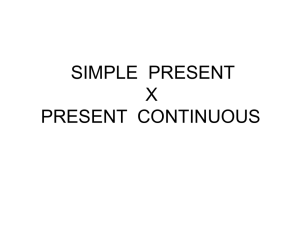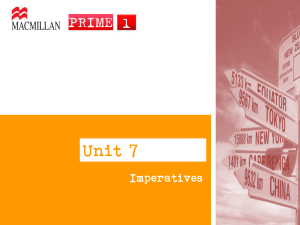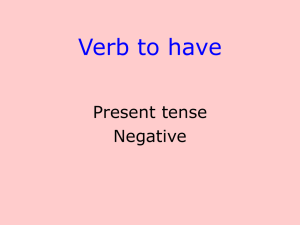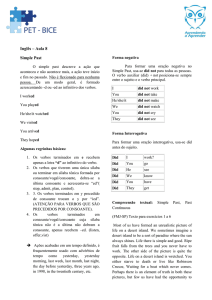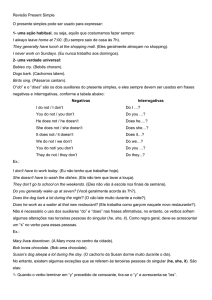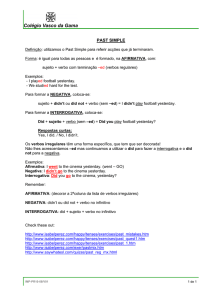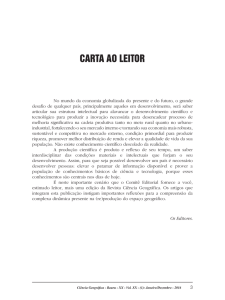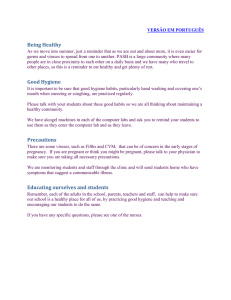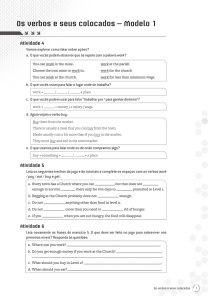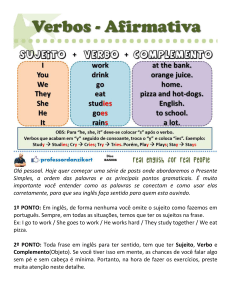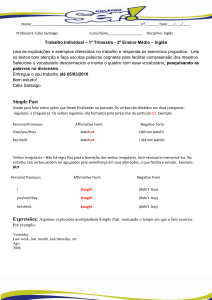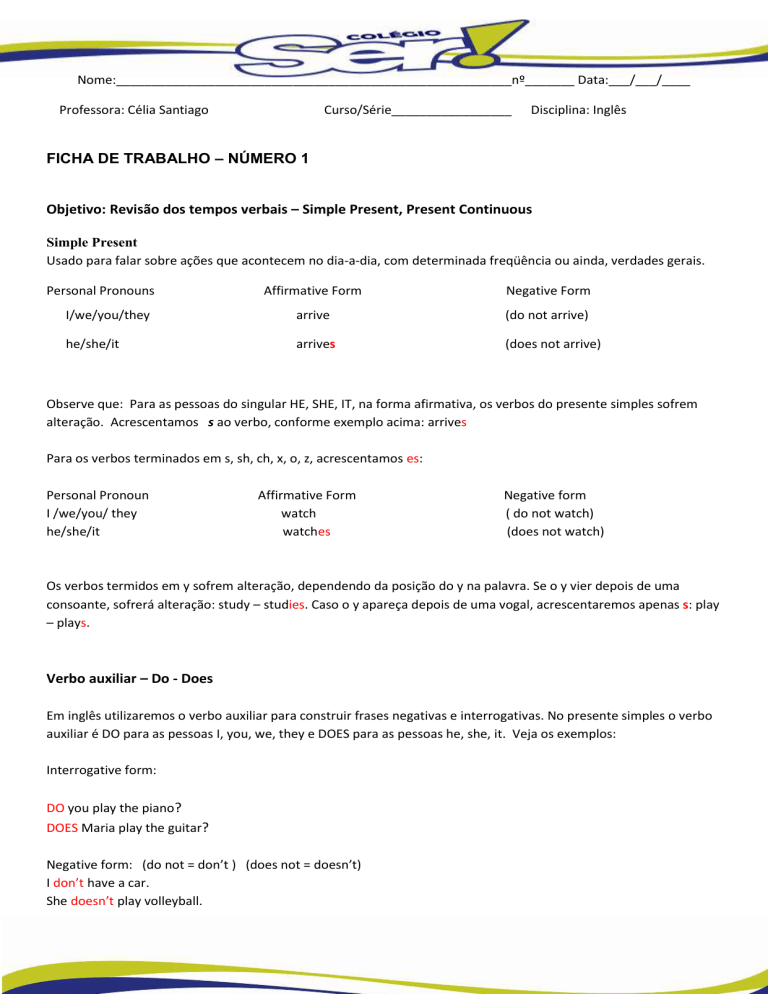
Nome:________________________________________________________nº_______ Data:___/___/____
Professora: Célia Santiago
Curso/Série_________________
Disciplina: Inglês
FICHA DE TRABALHO – NÚMERO 1
Objetivo: Revisão dos tempos verbais – Simple Present, Present Continuous
Simple Present
Usado para falar sobre ações que acontecem no dia-a-dia, com determinada freqüência ou ainda, verdades gerais.
Personal Pronouns
Affirmative Form
Negative Form
I/we/you/they
arrive
(do not arrive)
he/she/it
arrives
(does not arrive)
Observe que: Para as pessoas do singular HE, SHE, IT, na forma afirmativa, os verbos do presente simples sofrem
alteração. Acrescentamos s ao verbo, conforme exemplo acima: arrives
Para os verbos terminados em s, sh, ch, x, o, z, acrescentamos es:
Personal Pronoun
I /we/you/ they
he/she/it
Affirmative Form
watch
watches
Negative form
( do not watch)
(does not watch)
Os verbos termidos em y sofrem alteração, dependendo da posição do y na palavra. Se o y vier depois de uma
consoante, sofrerá alteração: study – studies. Caso o y apareça depois de uma vogal, acrescentaremos apenas s: play
– plays.
Verbo auxiliar – Do - Does
Em inglês utilizaremos o verbo auxiliar para construir frases negativas e interrogativas. No presente simples o verbo
auxiliar é DO para as pessoas I, you, we, they e DOES para as pessoas he, she, it. Veja os exemplos:
Interrogative form:
DO you play the piano?
DOES Maria play the guitar?
Negative form: (do not = don’t ) (does not = doesn’t)
I don’t have a car.
She doesn’t play volleyball.
Present Continuous – Present Progressive
Usado para ações ou eventos que estão acontecendo agora, no momento da fala, para planos futuros, ou ainda,
para mostrar que uma ação é repetida.
Personal Pronouns
Affirmative Form
Negative Form
I
am arriving
(am not arriving)
you/we/they
are arriving
(are not arriving)
he/she/it
is arriving
(is not arriving)
1) Complete the sentences with the verbs in parentheses. Use Simple Present or Present Continuous:
1) Phil ___________________________________________________ me every morning. (CALL)
2) Anne _____________________________________________________ breakfast now. (HAVE)
3) Lucy __________________________________________________ for a big company. (WORK)
4) Peter is a good student. He ______________________________ Math and Chemistry. (LIKE)
5) Ellen _____________________________________________________ the piano now. (PLAY)
6) The boys __________________________________to heavy metal on their MP3 player. (LISTEN)
7) Julia ____________________________________________________________TV now. (WATCH)
8) Fabio and Marcelo _______________________________their homework in the kitchen.(DO)
9) Alice _____________________________to the movies with her friends every Saturday. (GO)
10) Paula ______________________________________ to her Mother on the phone now. (TALK)
2) Change to the interrogative and negative forms. Use the verb BE or the auxiliary verb DO:
1) The maid listens to the radio every morning.
_______________________________________________________________________________________
_______________________________________________________________________________________
_______________________________________________________________________________________
_______________________________________________________________________________________
2) There are lots of people in the house.
_______________________________________________________________________________________
_______________________________________________________________________________________
_______________________________________________________________________________________
_______________________________________________________________________________________
3) She likes to walk in the afternoon.
_______________________________________________________________________________________
_______________________________________________________________________________________
_______________________________________________________________________________________
_______________________________________________________________________________________
4) There is a big animal in that cage.
_______________________________________________________________________________________
_______________________________________________________________________________________
_______________________________________________________________________________________
_______________________________________________________________________________________
5) The bus leaves at 7 o'clock.
_______________________________________________________________________________________
_______________________________________________________________________________________
_______________________________________________________________________________________
_______________________________________________________________________________________
6) The school is open every Saturday.
_______________________________________________________________________________________
_______________________________________________________________________________________
_______________________________________________________________________________________
_______________________________________________________________________________________
7) There are five children playing in the garden now.
_______________________________________________________________________________________
_______________________________________________________________________________________
_______________________________________________________________________________________
_______________________________________________________________________________________
8) They watch TV in the morning.
_______________________________________________________________________________________
_______________________________________________________________________________________
_______________________________________________________________________________________
_______________________________________________________________________________________

